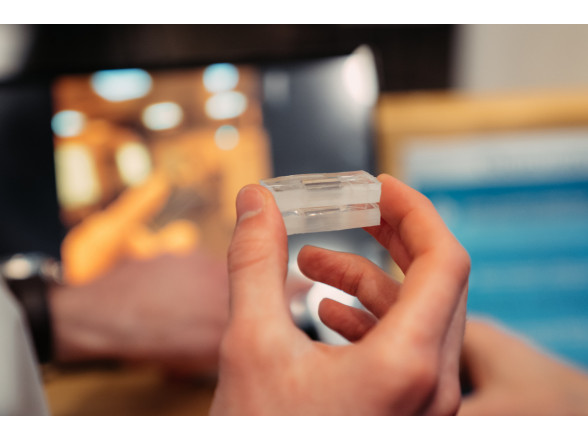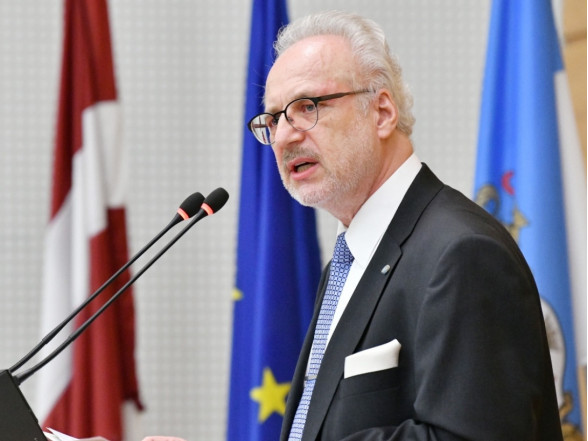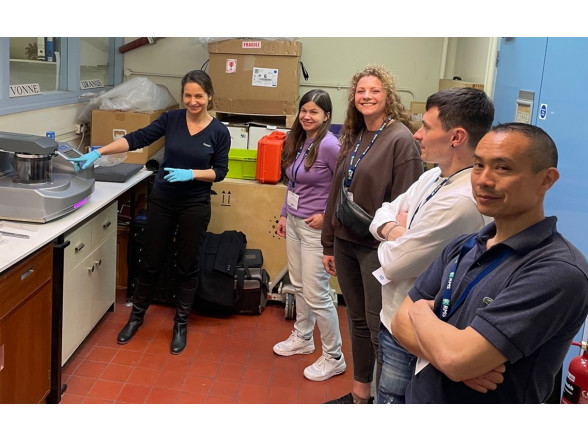At the end of March, two young scientists from ISSP UL’s Laboratory of Micro and Nanodevices, Gunita Paidere and Aleksejs Bendins, participated in the business incubator event organized by the student innovation program ESI with their team "Desal iT" to commercialize the water desalination device developed during the Deel Science Student Hackathon.
The young scientists, each with their idea, first applied to the Student Deep Science Hackathon 2022, organized by the ISSP UL and the youth organization "The Racoons". After meeting other participants, they decided to team up with two enthusiastic guys – Eduards Puišis and Matīss Kalniņš – and the idea of a microfluidic device for turning seawater into freshwater (desalination device) crystallized.
Team member Gunita Paidere admits that initially, it was not easy to bring this idea to life because this type of device had emerged very recently, and the number of scientific articles related to the chosen topic was limited. Therefore, it took quite a long time for young people to come up with what exactly is needed to make a prototype of such a device.
In the future, the device developed by the Desal iT team could be used in places where the amount of available freshwater is limited, and there is no access to a significant source of electricity, but there is access to saltwater supplies. As focus markets, the team chose boats and small/medium-sized yacht owners, who mostly take bottled water with them or use small reverse osmosis systems, a relatively expensive and inefficient way of obtaining freshwater.
Gunita Paidere says that the ESI student innovation program enormously contributed to developing the prototype and acquiring knowledge about creating a new product, commercialization, attracting investors and marketing. As part of the program, young people understood the potential market for their device, its needs and weak points, gained several valuable contacts and, most importantly - the opportunity to create their prototype in real life.
In general, Gunita admits that the experience in both the hackathon and the incubator has been a stepping stone in the development of the team’s desalination device and in raising her competence: "I have realized that after completing my bachelor’s degree, I would like to improve this idea further by continuing to improve the design and functionality of the device".
Gunita Paidere, a student of chemical technologies at the Riga Technical University, came to work at the ISSP UL three years ago after listening to just one presentation given by Roberts Rimša and Gatis Mozoļevskis, leading researchers of the Laboratory of Micro and Nanodevices. She was fascinated by their presentation about the cleanrooms and the exciting research directions of the then-newly established laboratory, so she applied to work in the laboratory. Gunita says that she became interested in exact subjects already during school: she participated in various chemistry- and physics-related extracurricular groups and events with great pleasure and participated in mathematics, chemistry and physics Olympiads.
Student Deep Science Hackathon is an event organized by the ISSP UL in which participants form interdisciplinary teams with pre-presented ideas, develop them together with mentors and at the end of the event, present a commercialization plan to a jury, scientists, investors and interested parties during three days. During the event, participants are provided with the support of mentors, a co-working environment and information for commercialization steps.
The innovation program for students at ESI was created to provide students with high-quality knowledge transfer, practical workshops, the opportunity to solve real-life commercial problems and the opportunity to develop their ideas through the business incubator and laboratories. The program is implemented by the Stockholm School of Economics in Riga, the Riga Graduate School of Law, the Latvian Academy of Arts, the Rēzekne Academy of Technology, consulting company Civitta Latvija and industry partners (Latvian Social Entrepreneurship Association, Zero Waste Latvia, Techhub, Institute of Solid State Physics, University of Latvia, Rezekne Business Association, Latvian Electrical and Electronics Industry Association).



